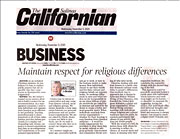Integrity Matters
November 9, 2005
Maintain respect for religious differences

 Question: (E-195)
Question: (E-195)
Dear Jim:
As an ordained Christian minister, do you believe it's
time to replace public prayers that are so specific that
they come across as disrespectful, even judgmental?
 Response:
Response:
Yes. But before I expand on my answer, allow me to
build a context for my recommendation. As a management
consultant, I seek to help individuals and organizations
function more effectively and profitably. Teaching powerful
people to listen attentively to all of their stakeholders,
and then behave graciously, is a complex and demanding
task. Always, our goal is to exceed expectations and,
then, as an entrepreneur and businessman, to be compensated
appropriately.
Clients may be liberal or conservative and may come
from diverse cultural, racial and religious groups. We
always maintain a clear separation between our personal
preferences and our professional competencies. We are
not asked by Hindu clients to leave our faith to join
theirs, nor do we seek to convert those who hire us to
accept our religious practices.
As a mentor taught me years ago, successful individuals
go to work, at least in the business world, to make money.
How individuals choose to use their wealth and live their
cultural and religious beliefs are separate issues. To
condemn differences in style and belief borders on the
irresponsible in an era when billions of people worldwide
are linked by an Internet and united by the desire to
create a better and more peaceful world. When individuals
seek help from service organizations - whether for food,
housing or even freedom from chemical addiction - it
would be totally inappropriate for providers to deny
them help on racial, cultural or religious grounds. Graciousness
and compassion dictate serving all who have needs.
Likewise, dealing with spiritual themes in a public
context demands extreme sensitivity to people's differences.
One excellent way to approach that is shown by Episcopal
Bishop William Swing, of San Francisco, who founded the
United Religions Initiative, a global religions organization.
When Bishop Swing convenes meetings with individuals
whose religious and cultural traditions span the globe,
he reminds participants that silence is one activity
that does not divide people.
With the sound of a bell, he invites those with whom
he is meeting to reflect, in silence, on mutual needs
and issues, in keeping with their respective traditions.
He concludes the respectful silence with the second ringing
of the bell.
This approach could be gracefully employed before a public
meal with individuals whose histories and traditions might
not be known - or shouldn't be assumed. By suggesting,
during the silence, that individuals offer their personal
thoughts and prayers, no one is diminished and everyone
is shown respect. Can integrity reach a higher level? Probably
not.